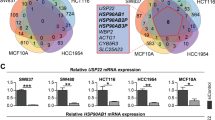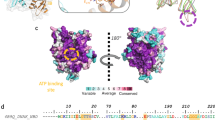Abstract
Heat shock proteins (HSPs) are necessary for cancer cell survival. We identified a mutant of HSP110 (HSP110ΔE9) in colorectal cancer showing microsatellite instability (MSI CRC), generated from an aberrantly spliced mRNA and lacking the HSP110 substrate-binding domain. This mutant was expressed at variable levels in almost all MSI CRC cell lines and primary tumors tested. HSP110ΔE9 impaired both the normal cellular localization of HSP110 and its interaction with other HSPs, thus abrogating the chaperone activity and antiapoptotic function of HSP110 in a dominant-negative manner. HSP110ΔE9 overexpression caused the sensitization of cells to anticancer agents such as oxaliplatin and 5-fluorouracil, which are routinely prescribed in the adjuvant treatment of people with CRC. The survival and response to chemotherapy of subjects with MSI CRCs was associated with the tumor expression level of HSP110ΔE9. HSP110 may thus constitute a major determinant for both prognosis and treatment response in CRC.
This is a preview of subscription content, access via your institution
Access options
Subscribe to this journal
Receive 12 print issues and online access
$209.00 per year
only $17.42 per issue
Buy this article
- Purchase on Springer Link
- Instant access to full article PDF
Prices may be subject to local taxes which are calculated during checkout





Similar content being viewed by others
References
Thibodeau, S.N., Bren, G. & Schaid, D. Microsatellite instability in cancer of the proximal colon. Science 260, 816–819 (1993).
Aaltonen, L.A. et al. Clues to the pathogenesis of familial colorectal cancer. Science 260, 812–816 (1993).
Ionov, Y., Peinado, M.A., Malkhosyan, S., Shibata, D. & Perucho, M. Ubiquitous somatic mutations in simple repeated sequences reveal a new mechanism for colonic carcinogenesis. Nature 363, 558–561 (1993).
Duval, A. & Hamelin, R. Mutations at coding repeat sequences in mismatch repair-deficient human cancers: toward a new concept of target genes for instability. Cancer Res. 62, 2447–2454 (2002).
Walther, A., Houlston, R. & Tomlinson, I. Association between chromosomal instability and prognosis in colorectal cancer: a meta-analysis. Gut 57, 941–950 (2008).
Giannini, G. et al. Mutations of an intronic repeat induce impaired MRE11 expression in primary human cancer with microsatellite instability. Oncogene 23, 2640–2647 (2004).
Sargent, D.J. et al. Defective mismatch repair as a predictive marker for lack of efficacy of fluorouracil-based adjuvant therapy in colon cancer. J. Clin. Oncol. 28, 3219–3226 (2010).
Zaanan, A. et al. Impact of p53 expression and microsatellite instability on stage III colon cancer disease-free survival in patients treated by 5-fluorouracil and leucovorin with or without oxaliplatin. Ann. Oncol. 21, 772–780 (2010).
Yamagishi, N., Saito, Y. & Hatayama, T. Mammalian 105 kDa heat shock family proteins suppress hydrogen peroxide-induced apoptosis through a p38 MAPK-dependent mitochondrial pathway in HeLa cells. FEBS J. 275, 4558–4570 (2008).
Hosaka, S. et al. Synthetic small interfering RNA targeting heat shock protein 105 induces apoptosis of various cancer cells both in vitro and in vivo. Cancer Sci. 97, 623–632 (2006).
Yamagishi, N., Ishihara, K., Saito, Y. & Hatayama, T. Hsp105 family proteins suppress staurosporine-induced apoptosis by inhibiting the translocation of Bax to mitochondria in HeLa cells. Exp. Cell Res. 312, 3215–3223 (2006).
Siatskas, C., Underwood, J., Ramezani, A., Hawley, R.G. & Medin, J.A. Specific pharmacological dimerization of KDR in lentivirally transduced human hematopoietic cells activates anti-apoptotic and proliferative mechanisms. FASEB J. 19, 1752–1754 (2005).
Kai, M. et al. Heat shock protein 105 is overexpressed in a variety of human tumors. Oncol. Rep. 10, 1777–1782 (2003).
Slaby, O. et al. Significant overexpression of Hsp110 gene during colorectal cancer progression. Oncol. Rep. 21, 1235–1241 (2009).
Trott, A., Shaner, L. & Morano, K.A. The molecular chaperone Sse1 and the growth control protein kinase Sch9 collaborate to regulate protein kinase A activity in Saccharomyces cerevisiae. Genetics 170, 1009–1021 (2005).
Andréasson, C., Fiaux, J., Rampelt, H., Druffel-Augustin, S. & Bukau, B. Insights into the structural dynamics of the Hsp110–Hsp70 interaction reveal the mechanism for nucleotide exchange activity. Proc. Natl. Acad. Sci. USA 105, 16519–16524 (2008).
Wang, X.Y. et al. Targeted immunotherapy using reconstituted chaperone complexes of heat shock protein 110 and melanoma-associated antigen gp100. Cancer Res. 63, 2553–2560 (2003).
Manjili, M.H. et al. Development of a recombinant HSP110-HER-2/neu vaccine using the chaperoning properties of HSP110. Cancer Res. 62, 1737–1742 (2002).
Manjili, M.H. et al. HSP110–HER2/neu chaperone complex vaccine induces protective immunity against spontaneous mammary tumors in HER-2/neu transgenic mice. J. Immunol. 171, 4054–4061 (2003).
Ceballos, E. et al. Inhibitory effect of c-Myc on p53-induced apoptosis in leukemia cells. Microarray analysis reveals defective induction of p53 target genes and upregulation of chaperone genes. Oncogene 24, 4559–4571 (2005).
Gotoh, K. et al. Apg-2 has a chaperone-like activity similar to Hsp110 and is overexpressed in hepatocellular carcinomas. FEBS Lett. 560, 19–24 (2004).
Suraweera, N. et al. Evaluation of tumor microsatellite instability using five quasimonomorphic mononucleotide repeats and pentaplex PCR. Gastroenterology 123, 1804–1811 (2002).
Buhard, O. et al. Multipopulation analysis of polymorphisms in five mononucleotide repeats used to determine the microsatellite instability status of human tumors. J. Clin. Oncol. 24, 241–251 (2006).
Grady, W.M. et al. Mutation of the type II transforming growth factor-beta receptor is coincident with the transformation of human colon adenomas to malignant carcinomas. Cancer Res. 58, 3101–3104 (1998).
Duval, A. et al. The mutator pathway is a feature of immunodeficiency-related lymphomas. Proc. Natl. Acad. Sci. USA 101, 5002–5007 (2004).
Rérole, A.L. et al. Peptides and aptamers targeting HSP70: a novel approach for anticancer chemotherapy. Cancer Res. 71, 484–495 (2011).
Jego, G., Hazoume, A., Seigneuric, R. & Garrido, C. Targeting heat shock proteins in cancer. Cancer Lett. published online, doi:10.1016/j.canlet.2010.10.014 (13 November 2010).
Brunet Simioni, M. et al. Heat shock protein 27 is involved in SUMO-2/3 modification of heat shock factor 1 and thereby modulates the transcription factor activity. Oncogene 28, 3332–3344 (2009).
Ribeil, J.A. et al. Hsp70 regulates erythropoiesis by preventing caspase-3-mediated cleavage of GATA-1. Nature 445, 102–105 (2007).
Acknowledgements
This work was supported by the Carte d'Identité des Tumeurs (CIT) program (http://cit.ligue-cancer.net/) from the Ligue Nationale Contre le Cancer and by grants from the Fondation de France (Ref. RAF08005DDA to A.D.), the Institut National du Cancer (INCa) (to A.D. and C.G.), the Conseil Regional de Bourgogne (to C.G.) and the European Commission Seventh Framework Programme (SPEDOC 248835 to C.G.). C.G.'s group is known as 'La Ligue Contre le Cancer'. A.C. is a recipient of an INCa fellowship. We thank B. Iacopetta for critical reading of the manuscript. We thank E. Roux, A. Hamman, E. Fourmaux and E. Bergman for their technical assistance.
Author information
Authors and Affiliations
Contributions
C.D. carried out analyses of aberrant splicing events due to MSI in CRC and genetic study of HSP110 in CRC cells and primary tumors. A.d.T. carried out analyses of wild-type and mutated HSP110 chaperone functions in CRC cells. A.C., M.S., A.L., K.W. and O.B. assisted with the mutational screening of primary CRC. J.G. (with G.J. and A.L.J.) carried out mouse work. L.M. carried out the clinical study and survival analyses. H.Z. and E. Tubacher assisted with the in silico search of candidate genes containing intronic microsatellite sequences. V.P.-L., S.K., J.S., G.M., M.-C.E.-G., L.B.-L., C.L., C.T., J.H.L., Y.P., E. Tiret, J.-F.F. and M.-P.G. provided CRC samples and clinical data. A.D. and C.G. conceived the project, coordinated and directed the study, and wrote the manuscript.
Corresponding authors
Ethics declarations
Competing interests
The authors declare no competing financial interests.
Supplementary information
Supplementary Information
Supplementary Figures 1–5 and Supplementary Tables 1–4 (PDF 2544 kb)
Rights and permissions
About this article
Cite this article
Dorard, C., de Thonel, A., Collura, A. et al. Expression of a mutant HSP110 sensitizes colorectal cancer cells to chemotherapy and improves disease prognosis. Nat Med 17, 1283–1289 (2011). https://doi.org/10.1038/nm.2457
Received:
Accepted:
Published:
Issue Date:
DOI: https://doi.org/10.1038/nm.2457
This article is cited by
-
Inhibition of Hsp110-STAT3 interaction in endothelial cells alleviates vascular remodeling in hypoxic pulmonary arterial Hypertension model
Respiratory Research (2023)
-
A first-in-class inhibitor of Hsp110 molecular chaperones of pathogenic fungi
Nature Communications (2023)
-
Consequences of the Hsp110DE9 mutation in tumorigenesis and the 5-fluorouracil-based chemotherapy response in Msh2-deficient mice
Cellular and Molecular Life Sciences (2022)
-
Heat-shock proteins: chaperoning DNA repair
Oncogene (2020)
-
Selecting the first chemical molecule inhibitor of HSP110 for colorectal cancer therapy
Cell Death & Differentiation (2020)



